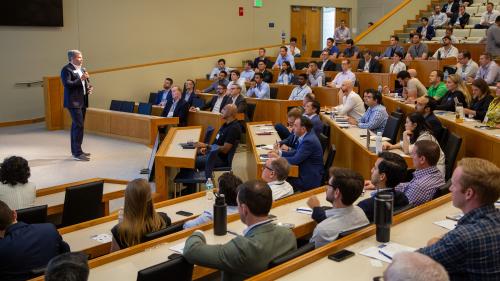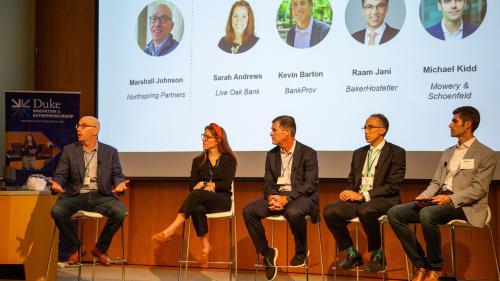
“I was really certain I was going back to private equity after my MBA,” said Arielle Lawrence (Asclepian Group). “But it’s hard to settle once you realize you can have everything you want in a career.”
Lawrence is one of a many drawn to entrepreneurship through acquisition (ETA), an increasingly popular route to success as a small business owner in which a searcher finds an existing company to acquire and run.
Ben Thomason, Managing Director for Private Equity & Venture Capital at Duke Innovation & Entrepreneurship (Duke I&E), said that for those unfamiliar with ETA, this may sound daunting—not to mention expensive. “Many people don’t realize that there are systems in place to support searchers, and different models of search funding, to where ETA is accessible to a broad range of professionals. The ETA ecosystem of searchers, investors, and other professionals is a highly supportive one.”

Bringing together that ecosystem—professionals already working in ETA, as well as students and others who want to explore ETA as a path—is a key goal of the annual Southeastern Entrepreneurship Through Acquisition (SEETA) Conference, hosted at Duke’s Fuqua School of Business this year in partnership with the Batten Institute at the University of Virginia Darden School of Business, the UNC Kenan-Flagler Business School, and Georgetown University’s McDonough School of Business.
In welcoming conference attendees, Duke I&E Director Jamie Jones urged them to consider not only the financial opportunities of ETA, but also its potential for impact. “Small businesses are the lifeblood of our economy,” Jones said. “You’re a leader with a unique voice and an opportunity to impact advocacy and influence policy that can have a positive impact for all of us.” Many conference panelists emphasized this aspect of ETA as well, with Hereford Johnson (People First Capital) sharing a story about how meaningful it was, especially having been raised by a single mother, to be able to give a receptionist $100K bonus at his company’s exit.
Following an overview of the ETA landscape by Steve Ressler of The Brydon Group, panels drew together a range of searchers and investors to discuss what makes someone want to be a CEO, how to prepare for search, how to build a team and do deals in an uncertain economy, and how to choose the right search model; conferencegoers also attended more intimate breakout sessions to explore topics like whether search was accessible to them, whether to acquire a big or small company, and what would happen if they didn’t acquire during their search.

Panelists were quick to discuss the challenges of search. “It’s the first time that you’re going to do a lot of work and see nothing for it,” said Thomas Campbell (Metric Marine & Industrial). “It’s like doing a master’s or PhD thesis ten times and having the first nine of them fail.”
Yet they all agreed that ETA presented unparalleled opportunities for growth. “The experience that you get from those 5-7 years [of the ETA journey] probably translates to 25 years of experience,” said Alexander Schuil (Briscoe Protective).
For many attendees, the conference presented an opportunity to demystify a complex field and make valuable connections.
“It was profoundly encouraging and refreshing to get a tangible feel for the ETA community and how many people really want to see searchers succeed and thrive as CEOs of their own companies,” said William Spokes ’97.
“The conference was a great introduction to ETA and an amazing opportunity to meet people working across all sides of the business,” said Jared Mandel MBA ’25.
Lessons From the Conference
When it comes to life as a CEO, “There are two distinct phases,” said Ayo Phillips (Perfect Surface). “Maximum effort without being able to see a lot of change, and then getting more results, peace, and balance. The early phases felt like driving a racecar, but then you look around, the sun is shining, there are people you’ve built something with, and there’s a lot more confidence.”

Panelists also emphasized that searchers should expect the unexpected.
Manvendra Saxena (Mars Energy Group) shared a story about acquiring and selling a company in just a 16-month span—not his plan coming in. “Our strategy was that we would run our business for seven or eight years, do our first small acquisition around year four, et cetera,” he said. But a competitor acquisition meant they were suddenly up against a $90M company—with a buyout offer. “It was our five-year upside case in year one, so it wouldn’t have made sense to hold on.”
“16 months is an extremely short hold period,” moderator Stephanie Warner (Relay Investments) remarked.
“It felt like sixteen years,” Saxena quipped.
Alexander Schuil (Briscoe Protective) had done four acquisitions when the COVID-19 pandemic struck, putting a lot of stress on his company. When their previous lender took them off the balance sheet, claiming they had dipped below the revenue specified in their contract, Schuil said they had to get creative in aspects of the business they may not otherwise have explored. “It was actually very good for the business,” he said, “because we had to focus on all sorts of operational concerns.”
Many panelists shared stories about personal development.
“After 10 years as an active military officer, the biggest thing that had to change was me,” said Stacey Krauss (Transitions Counseling and Consulting). “Often there was something I needed to change or do differently, adjusting my own leadership style to be a little less formal.”
Ultimately, panelists advised, in ETA it’s important to keep perspective. “Things are never as good or as bad as they seem,” Phillips said. “It’s really about managing your emotions and psychology through the journey. Celebrate the things that need to be celebrated, mourn the things that need to be mourned, but realize this is just another event.”
MORE VOICES FROM SEETA
Stacey Krauss (Transitions Counseling and Consulting)
“When you’re thinking about buying a company for yourself, it’s important to be yourself. What are the things about yourself that are unique to you that would lead you to connect to different industries, regions, or services?”
Arielle Lawrence (Asclepian Group)
“[In my earlier conversations exploring ETA] I wish I had asked the more personal questions, like what it’s like to let people down, what it’s like to move with your partner across the country, what it’s like to have family planning and balance conversations.”
Malcolm Peace (Tsetserra Growth Partners / Sort-Rite International)
“Our ideal seller is dealing with death, divorce or disinterest. They are motivated to sell and that motivation is often not all about money.”
Raam Jani (Baker Hostetler)
In a healthcare deal, you’ll see structures that just don’t work or are non-compliant. Before a deal gets done, mom and pop can do whatever they want. Once you bring in professional money and investors, you have to do things right. A lot of companies that aren’t labor-compliant walk when you bring up compliance with labor laws.
Hereford Johnson (People First Capital)
“Your number one success factor as a searcher compared to other buyers is your deal flexibility on terms other than price.”
Manvendra Saxena (Mars Energy Group)
“[Coming in as CEO] feels like imposter syndrome—everyone’s looking at you like you’re their savior or going to tell everyone what to do. … I remember signing a hundred thousand dollar check and then going to the grocery store and trying to decide whether to buy organic kale or non-organic kale.”